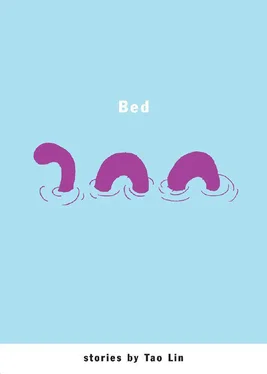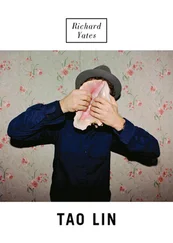“You’re ignoring the financials of it,” Chrissy said. She had a muffin and an herbal tea side by side in front of her.
“No I’m not. It’s the same,” Brian said. “You keep going into debt, buying whatever. You owe a hundred million dollars. Finally you die.” He was feeling a bit nauseated today. “You can’t argue this,” he said.
“By going into debt,” Chrissy said. “You’re hurting other people.”
“Credit card people aren’t people,” Brian said. “They’re credit card people.”
Chrissy moved her muffin away from her herbal tea. “You think you’re so cool,” she said.
Was she being hostile? Brian couldn’t tell anymore. Their love had been spent. Brian had spent it. There had been a sale at the mall, and Brian had brought coupons. “Buy things; we’ll make her better,” the mall had said. Brian had looked around a bit carelessly, without focusing on any one thing, but just making a vague sweep of it all. “Well, okay,” he’d said.
“You think you’re so wise,” Chrissy said. “You think you know more about life than the Dalai Lama or whoever. You secretly think that.”
“What?” Brian said. “Stop it. I’m just saying things.” He scratched the back of his neck. He looked at the muffin on the table. He began to say something that took a long time to say, but he didn’t know what it was, and no one else heard anything of it. His mouth moved, but no sounds came out, which could sometimes happen — you could speak and no sounds would come out.
There was a rumor that year, that you might not be yourself. That you might actually be someone else. One of those people who refuse antidepressants, who can’t hold down a job, who ends up sleeping, finally, in a hole.
That might be you, was what the rumor said.
People talked. They said, “There’s this rumor.…” Then they pointed out something amusing that was happening in the distance. They shrugged. Itched their forearms. They were easily distracted. Later on, though, in the mouthy dens of their bathrooms, they looked in their mirrors, and they just were not sure. Someone was there; but was it them? And so they believed. They said things like, “What does it even matter. I might not even be myself.” Then they threw themselves off a bridge, or else drank a quart of ice coffee and watched Indiana Jones and the Temple of Doom .
One night, after sex, Brian had — instead of making the dash through the kitchen, to the bathroom — cleaned himself with paper towels, rolled over, and gone to sleep. Chrissy had shaken her head at that, had made an annoyed noise and then run through the kitchen and showered.
But soon after, she too began to use paper towels. And then when they ran out of paper towels, they started using toilet paper, and a couple of weeks after that they stopped having sex.
It had become, in too many ways, similar to going to the bathroom.
Now they hugged a lot but rarely kissed. They said things like, “Instead of saying ‘good night’ every night, let’s just assume that we want each other to have a good night. That way we don’t have to feel obligated to say it every night.” They looked into each other’s eyes, and they saw contact lenses — the seized UFOs of them, dumb and shunned as plates. They yawned. They yawned wantonly, without covering their mouths.
They were having a fight one morning in their kitchen, in Brooklyn. Chrissy had spilled orange juice on the floor and then tried to kick it under the refrigerator with her sandals. Brian had watched through the hinge-area of the bedroom door. Had then walked in asking Chrissy if she thought this was a farm. Had kept asking that.
“You’re like a cow,” Brian said. “Yeah you are. No, a boar. I mean a pig. You think this is a farm.”
“Brian,” Chrissy said. She tried to look languished and fading-away — something like a corpse sinking into a lake at night — but ended up looking trashy and depraved, like a hooker. “Hey,” she said. “You’ve never given me an orgasm.”
“What?” Brian said. “Listen to me. Same here.”
“What?”
“I never had an orgasm with you,” Brian said.
“You Brian — you idiot, I mean. I’ve seen evidence of it.”
“You believe everything you see? It’s my body and I’m telling you that I didn’t ever orgasm with you.” Brian turned and opened the refrigerator and stuck his head in.
“Fuck you,” Chrissy said. “Yeah you did.” At this point in their relationship, it was overridingly important to win all arguments. Things were somehow at stake. Chrissy picked up Brian’s shoes. “Look at me,” she said. “Hey. Come here.” She went to the window and opened it, held the shoes outside. Brian looked. His head had begun to hurt. “Admit it,” Chrissy said. “Or I’m dropping your shoes.”
“I don’t lie,” Brian said.
“I’m dropping your shoes.”
“Are you going to drop them,” Brian said. “Or just talk about dropping them?”
“No I’m not. I’m not that kind of person. What if I hit someone’s head? See, you don’t even know me.”
“You think you know you?” Brian said. “Chrissy, you might not even be yourself. Remember that homeless woman you wouldn’t give money to? Yeah, I saw that. Well you might be her. So fuck you.” He put his head back in the refrigerator, and grinned. Sometimes you had to be a little bit insane. You had to say, “Give me that. Let me do it.” You had to take things from the world and bend them and then put them back in the world, bent like that.
It had something to do with fear. You had to reverse things. Make the world afraid of you.
Chrissy moved home to the Midwest. They had lived previously in her apartment, paid for by her parents, and Brian now moved to Jersey City, which was the other Brooklyn.
He used his college degree and got a job at a magazine corporation.
There were rooms with desks and rooms with views, and they gave Brian a room with a desk. “All the rooms have desks,” they said. “It’s a joke. So keep your pants on. It’s all a joke. Everything. You, me, this room. This whole damn spinning-swaying, car-crashing world.”
That was the tone of the place.
Each morning, a girl named Jennika would enter Brian’s room with a list of tasks.
“Here’s your tasks for today, Brian,” she would say.
Brian soon developed a crush on Jennika. She had a face, had all the right angles. She was shy and intelligent. Or else conceited and slow. Still, they could be happy together, Brian guessed, if she were only willing.
“That’s a strange name,” Brian said one morning.
“Oh.” Jennika hesitated, then smiled. “Here are your tasks.”
“You usually say, ‘Here’s your tasks for today, Brian,’ ” Brian said. He sometimes had the feeling that he was doing something illegal, something that he might be incarcerated for; or else something illusory, something that produced results, but only in some other, parallel universe, something that, in this universe, just did not produce any results.
“I do. Yeah.” Jennika blushed. She turned to leave.
“Wait,” Brian said. “What does this company do exactly? What do we make?” He had been wondering. Had come to one conclusion that they were producing a magazine for robots — because robots, Brian knew, would one day conquer the world. Afterwards they would probably want to read magazines.
“We’re a magazine corporation,” Jennika said. A kind of gluey indecision began in her eyes, a slow and brainward strain — this sort of melancholy distortion. It made it seem like she was very uncomfortable being alive.
“Jennika is a good name.” Brian tried to keep his eyes very wide and friendly, but could feel that the rest of his face was changing. Maybe the strain was in his eyes and not Jennika’s. Moments like these, it was hard to distinguish between yourself and others.
Читать дальше












